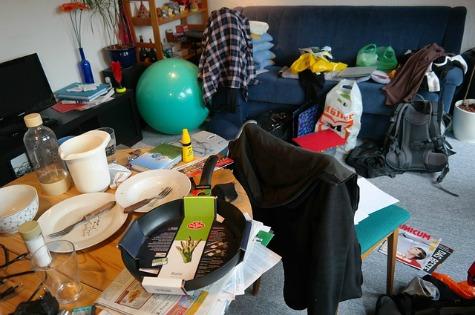Every now and then, there comes a time when your home starts to look a little too crowded. You notice that certain things start to gather in stacks, that the idea of dusting off a shelf of decorations makes your stomach churn, remembering how many things need to be moved to thoroughly clean it. And somehow, you find yourself having to clean up clutter more often than usual. This is a surefire sign that your home is in need of some serious decluttering. In this article, we listed several important steps for you to follow, to ensure that your home is not only clutter-free, but also stays that way for a long time.
Plan ahead
Contrary to popular belief, to truly rid your home of clutter, a significant amount of planning is required. This comes down to determining which rooms need to be de-cluttered, how much exactly you want to throw out and how much time you are willing to set aside for this project. Involve other family members into the planning process and go as far as dividing who gets to plan out which room. And if you live alone, you can always include your friends and family as a helping hand.
Identify the clutter
As a second step, you will want to go through your home and identify everything that classifies as clutter. Depending on the ease with which you are willing to part with them, this could be:
- Disposable objects – like booklets, drained batteries, empty tin cans and boxes, drawers full of scissors, pencils and so on
- Year-old objects – that Christmas card from your aunt you are afraid she will bring up some five years later, archived paperwork or documents from your previous job, old seasonal items and decorations
- Sentimental objects – the ones you kept from when your or someone else’s childhood, old concert tickets, toys, clothes, anything that triggers memories, but has no real use in your present life
When you decide which items go where, think long and hard about ridding your home of items from each category. Yes, even the last one.
Set the time
Just imagine the situation where you come home from work every day and into rooms full of sorting boxes and piles of junk just laying around. That’s enough to stress you out at a time of day when you need relaxing. To avoid spending more time than anticipated on simply sorting out random items, get a calendar and jot down the dates. Decide when you are going to clear out which room, and determine how much time you will need for each place.
Even if you work one day a week for a month, you will still feel secure just from this schedule.
Find helpers
As mentioned before, this whole process doesn’t have to be a tedious, torturous thing. Simply by asking your family members, friends, flat/housemates, you can gain another pair of helpful hands. And showing them you’re organized and well prepared, they will be more inclined to lend a few hours of their day every week or so. Just remember to set up some kind of meal compensation for the help – order takeout, stream a movie, or take them out somewhere as a thank you. They will surely appreciate it, and feel nice to know you acknowledged the trouble they went through.
The clutter itself
Now, when you have finally sorted out all the clutter into neatly sealed boxes, the time has come to finally categorize them based on where they will go. There are three things you can do. If the items are
in good shape, you can do the humane thing and donate them. If they have some damages, but are in a working condition, you can sell them, either through a yard sale or internet. And if they are beyond
repair, the best option would be to throw them out. And expert companies like Pinkjunk Rubbish Removal advise that you separate items that can be recycled, or otherwise reused.
Clutter-free mind
Decluttering your home is one thing, but continuing this kind of philosophy is a whole new ballpark. To avoid these overhauls in the future, teach yourself how to purchase and keep items around your house.
When choosing an item, think about its actual purpose. Is it practical and something you really need? If it’s decorative, will it tie the room together, or is it just – pretty? If need be, think over the purchase during the day. Sleep on it, and come back tomorrow to see if you still want it the same. The moment we begin to rationalize our desires, we allow for that practical part of our mind to overpower the impulsive one.
In summary
Cleaning your home from clutter can actually be a de-stressing project. Undoubtedly, we accumulate so many objects that we don’t need over the years that it begins to affect our day to day life, and way of thinking. But following the simple steps we mentioned before, you can not only declutter your living space in no time, but also learn to avoid building it up in the future. The impulsive, somewhat hoarder part of our brain can be controlled for the betterment of our lives.








 Agree (0)
Agree (0) Disagree (
Disagree (









__small.png)










